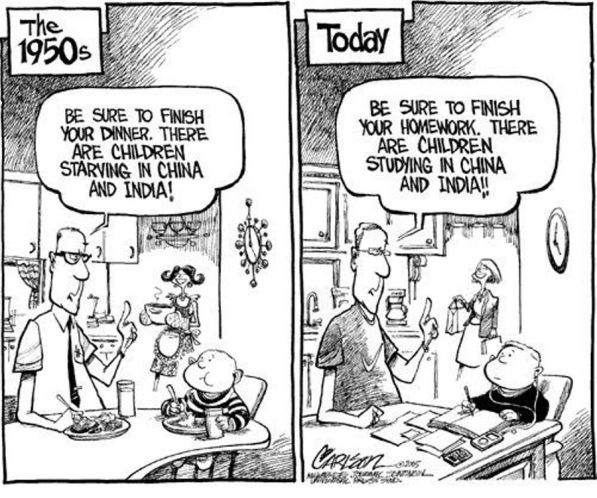The wonder that is the British political system

The performance British leadership during the 1945-2010 period is patchy – to say the least. Look at the British record of governance.
|
Visionary British leadership
In this post, let us keep this subject of British misrule in India aside, completely. Let us forget about it in this post. British misrule in India has been the subject of countless writers, journalists, analysts. Equally there have been many ‘studies’ about British ‘contribution’ to India’s progress.
We will instead, in this post, look at what we can learn from the British (as per India’s Free Press)
Why should Osborne’s actions be of relevance to us in India; one reason is because Osborne’s actions demonstrate the spectacular success of a remarkable British institution: the shadow cabinet.
As the name suggests, the shadow cabinet is made of up of senior members of the opposition who keep close tabs on their corresponding ministers, develop alternative policies and hold the government to account for its actions.
No surprise that many countries have adopted the system of shadow cabinets. As a former British colony, we have inherited a lot of our institutions from the British — including the bureaucracy! But somehow, the shadow cabinet system has eluded us. The result, inevitably, has been ministerial lethargy and poor decision-making . (via Shadowing ministers :Myth n Reality:Mythili Bhusnurmath’s blog-The Economic Times; parts excised for brevity).
Great myths never die … nor fade
Instead, let us look at British misrule in Britain itself. British ‘capabilities’ in areas of technology, industrial management, academia stands – naked and exposed.
After the guns fell silent
At the end of WWII, Britain was a superpower, its huge colonial Empire intact – apart from the massive debt that it owed the US, and India.
With Germany defeated and Hitler dead, Italy in shambles and Mussolini hanged, Japan nuked into submission, Britain sat at the head of ‘high tables’ in the post-WWII world deciding the fate of the nations – with its partner in crime, the US of A.
The US itself was financially dominant (with 25,000 tons of gold reserves), militarily effective (with atomic bombs) and industrially strong (unaffected by the WWII).
The Greatest Political Scam of recent times
From such a position, how could super-power Britain spiral down to bankruptcy, in less than 70 years, after WWII. Seen in this light, the record of British leaders is patchy – to say the least. Let us objectively look at the great British system of governance. A superpower in 1945, now in 2010, Britain is bankrupt.
More, the British mindset itself may need examination!
The Wall Street Journal points out
As Moody’s points out in a new report, what makes the UK so vulnerable to a sovereign debt crisis is the weakness of its banking system. Including private and public sector debt, the UK is one of the most leveraged countries in the world of debt equivalent to [400%] of GDP and a banking system still highly dependent on wholesale funding.
Britain today
With gross debt (including State, public and private sector debt) equaling 500% of its GDP. With its economy hollowed out in the last 60 years? From the position of a super-power to bankruptcy in less than 70 years.
Within 10 years of Indian independence, the British car industry started closing down. British coal mining became unviable within 15 years – and had to be shut finally. British Rail similarly collapsed. British capital goods industry (electrical, heavy machinery, electronics) went out of business. There is no British automotive industry worth talking about. British Steel collapsed and had to be nationalised within 20 years.
It may take an Indian, Ratan Tata, to revive British Steel and British automotive segments finally.
Stockholm syndrome, anyone?
Mythili Bhusnurnath is an old hand at journalism. She should know this – and I am sure she does. To see her going ga-ga about the British political system, letting go of journalistic circumspection is surprising.
Is there any record of such colossal political mismanagement in recent history?
Related Articles
- Starving India to India Starring (behind2ndlook.wordpress.com)
- Adiga’s Vacuum Theorem (quicktake.wordpress.com)
- Desi Nostalgia For British Raj (quicktake.wordpress.com)
- The British Salt Tax. How Damaging? (quicktake.wordpress.com)
- How British Raj Ended Thugee in India (2ndlook.wordpress.com)
- India was better off under British rule: Mohan Bhagwat – The Times of India (quicktake.wordpress.com)
- Caste System: Its’ Life & Birth (2ndlook.wordpress.com)
- Understanding 1857 (behind2ndlook.wordpress.com)
- Thomas Babington Macaulay: a giant of the British Empire (telegraph.co.uk)
- How India ‘Colonized’ Britain (time.com)
- British Reach Deal Package With India (nytimes.com)






 Exciting new series. From 1 Mar, 2010.
Exciting new series. From 1 Mar, 2010.
https://twitter.com/#!/StPTBarnum/status/197983918815850496
But they have …
Pax Americana does not: –
1. Even admit that it has an Empire
2. Appoint Viceroys and Governors
3. Expand its Empire in the name of the Empire – but in ‘secular’ notions like Democracy, Progress, Peace, Free Markets, fighting Communism, combating Islamic Fundamentalism.
4. Simply use Brute Force. But has the single-largest ‘secret-police’ and ‘secret-service’ operatives ever in the history of the world.
5. Depend on colonial soldiery to fights its wars. It has its own huge defence production and fighting force.